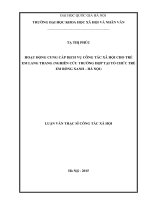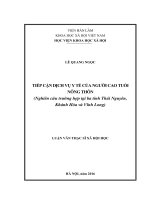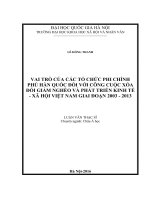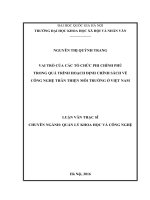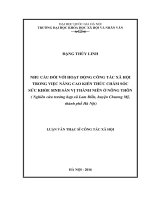Vai trò của các tổ chức chính trị xã hội cấp cơ sở trong việc đảm bảo an sinh xã hội cho cư dân nông thôn nghiên cứu trường hợp tại 2 xã tt tiếng anh
Bạn đang xem bản rút gọn của tài liệu. Xem và tải ngay bản đầy đủ của tài liệu tại đây (652.98 KB, 18 trang )
VIETNAM ACADEMY OF SOCIAL SCIENCES
GRADUATE ACADEMY OF SOCIAL SCIENCES
*****
NGUYEN THANH THUY
ROLE OF GRASSROOTS SOCIO-POLITICAL ORGANIZATIONS IN ENSURING
SOCIAL SECURITY FOR RURAL RESIDENTS: CASE STUDY IN 2 COMMUNES
THESIS SUMMARIZATION
Major: Sociology
Code: 9 31 03 01
Hanoi, 2020
0
The research work was completed in the Sociology Faculty, the Graduate Academy of Social
Sciences.
Scientific supervisor: Assoc.Prof-Doctor of Science Bui Quang Dung
Comment 1:
Comment 2:
Comment 3:
The thesis will be defended against the Academy-level Thesis Panel at the Graduate Academy of
Social Sciences
At …..(time),…..(date)…..(month)……(year)
The thesis is available at: ……
1
INTRODUCTION
1. The urgency of the topic
The positions and roles of socio-political organizations have been defined in the
1980 Constitution of the Socialist Republic of Vietnam. Since the country’s Doi Moi
period, significant changes have been made in the Party’s theoretical thinking on the
position and role of socio-political organizations in the context of the country's
industrialization and modernization, concretized in several legal documents and policies
related to these organizations.
At present, socio-political organizations have shown greater roles in socioeconomic development by providing and supporting social services to the Government.
They play significant roles in running credit programs in localities, especially when the
Vietnam Bank for Social Policies (VBSP) assigns credit programs to mass organizations.
The involvement of socio-political organizations in poverty reduction programs has, on
one hand, enhanced the effectiveness of programs, and on the other hand also shown the
changes in these organizations’ roles to adapt to the new context. However, due to certain
limitations, the role of socio-political organizations in ensuring social security has so far
only been recognized in poverty reduction. One may still recognize the role of these
organizations in other components of the social security system, however they have not
yet been fully nor properly recognized.
On the other hand, a controversal issue has recently been debated over whether the
social security system of Vietnam is capable of ensuring coverage to most residents or
not, especially those in the countryside. In that context, the research topic on "Role of
grassroots socio-political organizations in ensuring social security for rural residents: case
study in 2 communes" aims to make clear and specific assessments on the role of sociopolitical organizations at present as well as the way they manage to ensure social security
for the community in the current situation of national industrialization and modernization
and transformation of society.
2. Purposes and tasks of the research
Purposes of the research
The thesis aims at understanding the role of grassroots socio-political
organizations in ensuring social security for rural residents through the implementation
and support of labor market policies as well as social assistance in rural communities, and
base on that to propose a number of recommendations to improve the performance of
socio-political organizations in the current context.
Specific objectives
2
- To find out the role of socio-political organizations in supporting the implementation of
labor market policies through such activities as information support and consultation;
vocational training and job placement; and loan support;
- To find out the role of socio-political organizations in social assistance activities in
localities through regular and irregular social assistance;
- To propose recommendations to enhance the operation of these organizations in the
current context of Vietnam.
3. Subjects and scope of the research
Research subjects: The role of grassroots socio-political organizations in ensuring
social security for rural residents.
Research objects: Households in rural areas of the surveyed communes and officials,
socio-political organizations and citizens in the two localities.
Scope of the research: The research was conducted in 2016 in four communes: Dai
Phuc and Ninh Lai communes in Tuyen Quang province and Khanh Lam and Khanh Hoa
communes in Ca Mau province.
4. Methodology and research methods of the thesis
Research questions
- How have socio-political organizations fulfilled their roles of supporting the
implementation of labor market policies and what difficulties have they encountered
during implementation?
- How have socio-political organizations fulfilled their roles of supporting the
implementation of social assistance policies and what difficulties have they encountered
during implementation?
Research hypotheses
- Grassroots socio-political organizations have actively participated in and solved many
problems during the course of implementation of labor market policies.
- Grassroots socio-political organizations have actively participated in and solved many
problems during the course of implementation of social assistance policies.
Research methods
(*) Document summarization, comparison and analysis: the thesis uses
secondary and primary documents; (*) In-depth interview: helps provide and supplement
the missing information that cannot be collected via interview method by the
questionnaire; (*) Group discussion: provides specific and detailed information on
viewpoints; (*) Questionnaire interview: provides general data on frequency related to
the research issues. (*) Information processing and analysis include qualitative and
quantitative information. (*) Research samples: quantitative surveys have been made in
3
400 households in 4 communes: Ninh Lai and Dai Phu communes in Son Duong rural
district, Tuyen Quang province, and Khanh Lam and Khanh Hoa communes in U Minh
rural district, Ca Mau province, while qualitative surveys include 51 in-depth interviews
and 6 group discussions.
5. New scientific contributions of the thesis
New contributions:
(*) As Vietnam has set a target of having the whole citizenry covered by the
social security system and basically meeting the social security needs of the people by
2020, the assurance of social security has become increasingly urgent. (*) This study
contributes to providing a valuable research data on the role of socio-political
organizations in ensuring social security for rural residents. (*) It also helps laying the
foundation for the subject of organized sociology and make contributions to the political
sociology subject in Vietnam.
Limitations of the research
Since this research was conducted in the rural areas only, trade unions are not
included in the study.
Regarding the role of socio-political organizations in ensuring social security for
rural residents, this research focuses only on two components, namely the labor market
and social assistance. The research did not explore the social insurance component in this
study as the researched communes are wholly covered by social insurance.
Despite the fact that the labor market policy consists of several policies, this thesis
assumes that the labor market policy system directly related to and having impacts on
socio-political organizations only includes employment policies, vocational training
policy and credit policy.
6. Theoretical and practical significance of the thesis
Theoretical significance: The thesis contributes to verifying the universality as
well as the accuracy, rationality and applicability of the role theory and organized
sociological theory. In addition, the thesis also aims to contribute more foundations to
political sociology.
Practical significance: The thesis also helps policymakers, local authorities and
residents to assess socio-political organizations’ effectiveness of in ensuring social
security, thereby making appropriate operational policies and mechanisms, and at the
same time helping organizations to evaluate their own operations to search for better
performance.
4
Chapter 1.
AN OVERVIEW OF RESEARCH SITUATION
In terms of social policies, socio-political organizations are responsible for
supervising the implementation of the law on social security, including receiving people's
feedback, directly collecting information and data for reviewing, monitoring and
detecting law violations of agencies, organizations, units or individuals in the
implementation of the law on social security, and making direct recommendations to
competent authorities for settlement. From the people's view, apart from their traditional
advantages, socio-political organizations have long been operating in a bureaucratic
manner, controlled by People’s Committees and therefore losing the true function of
operating as associations.
Regarding the role of socio-political organizations in grassroots democratic
mobilization in localities, the Vietnam Fatherland Front has, together with these
organizations, restricted the conflicts between people of different strata as well as
between people and government through the propaganda, supervision, development and
implementation of the grassroots democratic regulation. The people may also supervise
the operation of the Government via organizations, and discuss and decide their own
activities in accordance with the Constitution and relevant laws. Though having good
sources of investment, socio-political organizations tend to operate in a bureaucratic
manner and stay away from the masses. Socio-political organizations were later
organized and stereotyped in an authoritarian manner, dependent on the authorities and
unable to inspect and supervise the operation of the authorities.
Regarding the role of socio-political organizations in poverty reduction and socioeconomic development, these organizations have shown a greater role in socio-economic
development since Doi Moi by providing social services to the Government. They have
shown their dual functions of both social and developmental issues. Poverty reduction
activities were focused in the operation of social organizations in general and sociopolitical organizations in particular. The role of these organizations only became
significant when the VBSP started entrusting credit programs to local organizations. It
can be drawn from current studies that organizations and credit funds are functioned to
support the people in the way social welfare organizations support and assist the citizens,
especially vulnerable groups. The role of socio-political organizations is also particularly
emphasized as one of the positive solutions that contribute to poverty reduction,
education, health, culture and social security assurance for rural residents.
5
Chapter 2.
THEORETICAL AND PRACTICAL FOUNDATIONS OF TOPIC RESEARCH
1.1. Interpretation of terms
According to the Oxford Dictionary of Sociology, role is a key concept in
sociological theory. It emphasizes the social expectations associated with certain
positions in society and analyzes the performance of those expectations. Role is
construed as socio-political organizations’ undertaking of social assistance activities for
the people on two aspects of the national social security system: labor market and social
assistance.
Social security means the system of state intervention policies and supports of
individuals and organizations (within the framework prescribed by law) in order to
reduce the level of poverty and vulnerability, enhance the self-protection capacity of the
people and society against risks of reduction or loss of income, ensure social stability,
development and equity, and improve people's ability to cope with risks by supporting
and equipping them with methods to improve the living standards of individuals and
households. This system includes 3 main policy groups: i) Labor market policy; ii) Social
insurance; and iii) Social assistance.
According to the Vietnam Social Security terminology, labor market is an
economic term used to refer to the labor exchange in a country, region or sector or line.
Labor market policies include active and passive labor market policies. In this study, we
focus on the labor market policies in terms of employment policies, training (vocational)
and credit for those in need (looking for a job or being trained for production and
economic development).
Social assistance means the State and society (individuals and organizations)’s
guarantee and support for members of the community to overcome initial and long-term
difficulties in life as well as improving their living standards. This assistance is provided
through financial support, workday assistance or in-kind support to ensure community
welfare.
Socio-political organizations, also known as mass organizations founded by the
Communist Party, aims to reach out and mobilize the masses to join and support the
Party's policies. The roles, duties and powers of socio-political organizations are defined
in the laws or regulations of each organization. As the research was conducted in rural
areas, only 5 socio-political organizations were mentioned, namely the Vietnam
Fatherland Front, the Women’s Union, the Farmer's Union, the Veteran's Association and
the Youth Union.
6
1.2. Application of theories to the thesis
Role theory: the change in the role of organizations and groups in the current
process of Vietnam’s socio-economic development from the stage of centralized
bureaucracy to the stage of socialist-oriented market economy has posed several
problems. At this time, the role of socio-political organizations needs to be modified to
suit the new context. In fact, the actual and expected roles of organizations need to be
considered in order to ensure the conformity to help them operate more effectively.
Theory of organized sociology: These organizations have specific rules, tasks and
goals, and their members therefore must also have appropriate communication behaviors
in line with their functions, duties and powers in that organization. The formulation of
regulations and resolutions set out in the congresses of unions aims to ensure and serve
the interests of the organization. These organizations will operate more effectively with
clear unification and operational principles.
7
Chapter 3.
SOCIO-POLITICAL ORGANIZATIONS’ PARTICIPATION IN LABOR
MARKET POLICIES IN RURAL AREAS
3.1. Information support and consultation on production development
In recent years, Tuyen Quang and Ca Mau provinces have actively implemented
programs and organized counseling campaigns on employment and socio-economic
development. However, only 11.6% of the people are interested in these activities, mainly
on job consultation and placement programs. Only 11.8% and 8.4% of the surveyed
residents have heard about scientific and technological transfer and production
consultation, respectively, recording no difference between Ca Mau and Tuyen Quang
provinces.
Among the three forms of support provided by mass organizations to support
citizens’ production development, there is no big difference between the forms supported
by the Women’s Union (less than 3%). However, relatively different opinions are
received in other organizations (more than 10%), such as the Farmer's Union, Veteran's
Association and Youth Union. The form of providing information, advice and
consultaton and the support of scientific and technological transfer in economic
development are highly appreciated by the people compared to the remaining form,
specifically 44.4% and 47.8% in the Farmer’s Union and 31.2% and 33.9% in the
Women’s Union. Compared to the other three organizations, the Youth Union tends to be
underestimated by the people in its way of effectively providing assistant forms.
When answering what values among the 12 offered values they expect to receive
by joining organizations, the surveyed people highly appreciate the role of organizations
in providing information, advice and consultation in supporting production development.
This value was selected in all four organizations, in which the Farmer's Union and
Women's Union are the two most appreciated organizations.
The rate of people receiving support from organizations accounted for a relatively
high proportion in all 5 organizations, only lower than the rate of those who are visited or
encouraged by the authorities when being sick. The highest proportion falls in the first
group, with the Women's Union (36.9%) followed by Farmer's Union (34.4%), while the
latter group includes the Veteran’s Association (15.3%) and the Fatherland Front and
Youth Union of less than 10 %.
Comparing support activities between members and non-members of
organizations, it can be seen that members of these organizations tend to receive more
8
supports than those who are not members of organizations. This difference is surprisingly
high in the Farmer’s Union, Women’s Union and Veteran’s Association (nearly 50%).
3.2. Đào tạo nghề và giới thiệu việc làm
a) Đào tạo nghề
3.2. Vocational training and job placement
a) Vocational training
The current vocational training and scientific and technical transfer activities are
mainly carried out by mass organizations, focusing on the Farmer's Union and Women's
Union. Among the 8 stages of vocational training activities that socio-political
organizations may participate, only 4 stages are highly appreciated by the people,
according to the survey. Notably, the propaganda and advocacy stage ranks top with over
90% and sees no big difference between organizations (less than 5%), of which the
Veteran’s Association is highest among the five groups. The second most highly
appreciated stage is the training and provision of information on local vocational training
programs. Accordingly, the Farmer's Union (53.8%) and the Women's Union (53.5%) are
significantly higher than the other two organizations, especially the Youth Union, which
is more-than-10-percent lower than other organizations. The managerial role in
vocational training activities ranks last among the 4 stages in all organizations (below
28%), with the Farmer’s Union and the Youth Union being the lowest (23.1%).
Those who participated in vocational training courses are mainly people with
average education level (54.5% of secondary school graduates) while the proportions of
high school graduates and from primary school and below are 30.3% and 15.1%,
respectively. A significant proportion of 37.9% of respondents cited the reason for not
participating is because they did not know about these training courses. This poses a
problem in the way of propaganda, notifications and provision of information to local
residents.
In terms of vocational training, it seems like the membership of a socio-political
organization can be considered as an advantage. And this was further confirmed through
in-depth interviews with leaders of a number of organizations (the Farmer’s Union and
the Women’s Union) as they considered this as an obvious factor upon consideration of
participants in training classes for organizations. As long as the people are aware of the
importance of vocational training classes, the membership of socio-political organizations
will still be an important value and necessary motivation to attract people to participate in
these organizations.
b) Job placement
9
Those who get a job through unions are often those with average or higher income
(85.7%) while those who were not introduced by unions came from the group with lowest
income (46.6%). There is no big difference in the two remaining income groups.
Among those who got jobs through the introduction of mass organizations, there
was no big difference between members and non-members of organizations (14.2%).
Meanwhile, for those who were not, the difference was up to 25.4% with a large
percentage concentrated in non-members of unions.
Most of those who were not introduced to jobs have average educational levels,
31.2% and 45.7% graduated from primary and secondary schools, respectively.
Meanwhile, those whose jobs are introduced by groups often have higher levels of
education, 47.6% and above 38% graduated from secondary and high schools,
respectively.
Among the mass organizations, the Women's Union has the highest rate of job
placement with 66.7%. Most of those whose jobs were introduced by socio-political
organizations were young people aged under 35 years (42.9%) and working in
agricultural sector (61.9%), while women accounted for a high proportion (43.2%).
In addition, 59.7% of people with high income are not interested in knowing or
participating in job placement programs.
3.3. Loan support through the local credit system
a) Loans entrusted by the Vietnam Bank for Social Policies
The Farmer's Union and the Women's Union are considered two important
organizations as they account for a majority proportion of having households borrowed
loans from the VBSP (52.8% and 42.2%, respectively). This was also shown and
demonstrated specifically in the annual reports of mass organizations.
Those who borrow capital from the Youth Union were households with average
or good income. The proportion of poor households who borrow loans is mainly
concentrated among people who are members of Veteran’s Association (53.8%) and
Farmer’s Union (42.1%). Meanwhile, the number of households with good income are
not so different between groups, more or less than 30%), a rate not too high but
significant for a lending program for poor households.
It seems like the role of socio-political organizations has not yet been fully
recognized as the way they expected. People only knew that they were granted loans
thanks to the VBSP, and need not to know which union entrusted them. As for the cadres
of grassroots organizations themselves, they also find themselves acting as a bridge
between the bank and the people, or work for the bank in other way. In fact, grassroots
organizations expect this to be one of the most important ways to increase members for
10
organizations, which may attract people to organizations by giving them direct benefits
from loans for production development.
b). Other funds and groups and lending or loan programs
Borrowing capital can be considered as one of the key benefits that members of
unions are interested in joining these organizations, specifically the Women's Union
(18.9%), Farmer’s Union (14.1%) and Veteran’s Association (14.7%). 21.5% and 15.2%
of the surveyed people shared that the opportunities of capital borrowing have motivated
them to join the Women’s Union and the Farmer’s Union, respectively. Meanwhile, this
is not a reason for them to decide to join the Veteran’s Association and the Youth Union,
with only 8.3% and 8.2% of the answer, respectively. However, there is a difference
between Tuyen Quang and Ca Mau provinces in providing reasons for joining
organizations to receive concessional loans.
Apart from the association's funds which are required to pay 60% to district-level
funds for operation, there are several forms of capital support for members of these
organizations, especially the Farmer’s Union and the Women's Union. Through the
activities of these groups, people may have another source of funding support for
economic development and household activities. This is especially meaningful for lowincome households who do not have chanes to access to different forms of loans. For a
locality with a high number of ethnic people and another in the southernmost point of the
country whereas the life of rural residents is still difficult, supports from lending groups
or sub-groups which are formulated, organized and managed by unions are extremely
necessary and meaningful.
11
Chapter 4
SOCIO-POLITICAL ORGANIZATIONS’ IMPLEMENTATION OF SOCIAL
ASSISTANCE ACTIVITIES IN RURAL AREAS
4.1. Regular social assistance
Regular social assistance in the community is currently a fairly widespread
development activity in localities. According to survey results, there are diversified
activities in the surveyed areas such as building houses of gratitude (15.2%), helping
people with special difficulties (16.1%), donation and supporting programs (21.7%),
helping policy families (14.7%), and visiting or caring for Vietnamese heroic mothers
and people with meritorious services (11.6%).
People’s levels of information accession to different supporting forms in the
community are relatively similar. Among them, donation programs still account for the
highest proportion with 27.1%, probably thanks to the abundance of beneficiaries and the
diversity of supporters. Communication activities for these activities are also diverse,
with people being aware of local social assistance activities through different channels,
especially the 3 main channels of village or hamlet meetings (51.3%), mass organizations
(50.6%), and from heads of villages or hamlets (44.1%).
The mass organizations’ supports focus on helping two main target groups, the
poor in general (96.2%) and different groups within the framework of supportive
activities mobilized by the State and the Vietnam Fatherland Front (98.6%). According to
summary reports of local mass organizations, the building of member contribution funds
has also been actively implemented by mass organizations.
People may join hands in charitable activities in various forms such as donations
with money, in kind or workdays, either in formal or informal way.
Except for the Youth Union that records no variations in the values, the remaining
organizations showed different viewpoints in considering the three values they received
when participating in socio-political organizations. Members of the Youth Union highly
appreciated the values of interaction and junkets (the highest with 33.3%). The Veteran’s
Association, meanwhile, appreciated the benefits of expanding social relationships more
than other organizations (53.1%, far high than the lowest organization, the Women's
Union). Visiting and encouraging people remain the most highly appreciated values in all
organizations compared to the remaining values.
In terms of subjects, the subjects of this charitable donation include the
authorities and mass organizations, in which the citizens highly value the role of the
authorities in this activity (40.2%), with less recognization given to other socio-political
12
organizations (less than 25%). Comparing these organizations, the roles of Women's
Union and Farmer's Union are highest with 38.7% and 37.6%, respectively, while the
Youth Union is the lowest with less than 15%.
While people in Tuyen Quang province tend to associate charitable activities with
the role of mass organizations (over 70%), those in Ca Mau tend to appreciate this role
for other groups of individuals and organizations (57.1%).
In terms of operational methods, charitable activities of the Fatherland Front, the
Veteran’s Association and Youth Union are the three least-known organizations (around
70% are not aware of their presence in this activity), while the percentage of people
acknowledged charitable activities of the Women's Union as well as the Farmer’s Union
are significantly higher. Meanwhile, the percentage of people who are aware of charitable
activities of the Farmer’s Union and the Women's Union through organizations’ meeting
account for 66% and 55.8%, respectively, much higher than the rate of those who heard
from radios (21.8% and 21.4%) as well as other forms. This shows that the method of
communication through meetings still achieves the best effect.
There are not so many forms for people to engage in charitable activities launched
by mass organizations. Among the 4 forms of cash, artifacts, working days and
consultation, only two of them are used by local people, cash and working days, in which
cash accounts for a majority of 66% as it is convenient and saves time. Basically, the
contribution rate in Ca Mau is much lower than that in Tuyen Quang province. Although
the form of cash support in Ca Mau province is the highest compared to other forms
(33.2% while the proportion of non-support accounts for 66.3%), it is still lower than
Tuyen Quang province with 49.6%. Residents in Tuyen Quang province tended to
support cash (74.8%) while this trend was not significant in Ca Mau province, and the
form of support by workdays witnessed the same trends in the two provinces.
People with low incomes tend to donate cash while high-income groups tend to
spend workdays for support (42.9% in the highest-income group and 0% in the group
with lowest income). The group of union members had a higher percentage of workday
support of more than 85.7%, while the percentage of cash support is similar among
groups.
Meanwhile, 31.8% of respondents do not support in any form, which may be
explained by such reasons as income; job; non-membership of unions; localities. Most of
them are from the poor group (64.7%) or working in agricultural sector (74.7%) or are
not member of unions (85.8%). They do not support via mass organizations because most
of them make supports through the government (51.2%) as they are neither mobilized to
support (25.6%) nor aware of supporting activities (18.6%). Ca Mau people have a
13
notably higher rate of non-support (98.5%) than those in Tuyen Quang province because
the proportion of people participating in unions in Ca Mau is lower than the remaining
surveyed localities.
From the scale of organizations, it can be seen that mass organizations have
actively set up funds to support members and families with difficulties in their localities.
In addition, along with the support from district- and provincial-level mass organizations
and human resources of local organizations, many activities have been carried out to
support members of organizations such as building houses of gratitude and helping poor
households to build and repair houses; launching the movement of savings made from
plastic pigs or bamboo tubes; and establishing such funds and groups as capital
contribution funds and farmer support funds, among others.
In addition to funding support, mass organizations also provided different forms in
which residents’ support can be provided by workdays or in kind, among others. These
forms of assistance may increase the number of beneficiaries who are members or nonmembers of organizations.
4.2. Irregular social assistance
While cash is the main choice for regular support activities (donations support for
central, local and institutional funds), irregular activities that require quickliness and
effectiveness attracted various forms of monetary support (95%) and workdays (92.8%).
Workdays account for a sizable proportion such organizations as the Youth Union
(85.4%) and Farmer’s Union (82.4%), same for Tuyen Quang and Ca Mau provinces.
However, in general, locals in Tuyen Quang province tend to contribute in cash to mass
organizations while in Ca Mau province its people choose to spend workdays.
These organizations are mostly recognized as the groups who called for charitable
contributions only, with 38.7% and 37.6% of the respondents aware of the role of the
Women’s Union and Farmer’s Union, respectively, while other unions account for low
rates of less than 10%.
The remarkable differences between the two localities drawn form the assessment
of the role of mass organizations in donation and support activities do not reflect that
Tuyen Quang’s organizations have better performance than those in Ca Mau province. It
only shows that mass organizations in Tuyen Quang province have made significant
donation activities than Ca Mau unions.
14
CONCLUSIONS AND RECOMMENDATIONS
1. Conclusions
Socio-political organizations have expanded their roles with diversified functions.
On the one hand, these organizations not only focus on the function of gathering,
educating the masses to participate in and effectively implement policies and guidelines
of the Party and the State, but on the other hand, they also considered the protection and
assurance of legitimate needs and interests of members in their organizations as a
fundamental function.
They have provided several activities in different forms of information support,
consultancy, vocational training, job placement or lending for production, in which the
roles of the Women’s Union and the Farmer’s Union are highly appreciated while other
organizations have not shown effective performance. However, even for organizations
that are considered to be as effective as the Women’s Union and the Farmer’s Union, this
role has not yet been clear nor identified as the role of any single union. The fact that
several organizations undertaking a same activity will do nothing but lead to overlapping
and loss of their individual characteristics.
Institutionally, the basic function of these organizations is to mobilize and
propagate the Party and State's guidelines and policies. According to annual and final
reports of organizations, the functions to support members for economic development
have also been established and highly recognized. However, the practice shows that
neither those who implement policies (cadres) nor beneficiaries (the people) appreciate
this role of mass organizations. People only consider unions a mere bridge, having no
role in their enjoyment of policies, especially labor market policies. Thus, it will be
difficult for a socio-political organization to perform its role of a specific subject that
supports the implementation of labor market policies to ensure social security for rural
residents in the shadows of the State.
In addition, the works that unions are currently performing are mainly through the
governing bodies with separate implementation responsibilities. So is it necessary to
carry out these activities via these organizations while already having specialized
personnel to carry out these works?
In general, though organizations have expanded the forms of propaganda, meeting
appears to be the most effective way. The current form of donation in a set amount
prescribed by a high-level union to a lower one has shown many inadequacies. First, it
transformed the nature of this volunteer activity to compulsory instead of voluntary.
Secondly, the government is still a factor of consideration that affects people in charitable
15
activities in rural areas. Unions have the advantage in establishing programs, saving
movements, helping each other to borrow capital for production development, reducing
poverty and improving living standards, however these activities are effective internally
only.
2. Recommendations
Through the results of the research, the thesis proposes a number of recommendations as
follows:
2.1. Socio-political organizations should deploy different ways of propaganda and
support for each rural population group.
2.2. If organizations only performs the role of propaganda and advocacy, they only need
to act as a merely bridge as they are today. Once they have expanded their operational
functions with economic development roles for their members, it is necessary to have
appropriate institutions for them to operate effectively.
2.3. Socio-political organizations, especially the Women's Union and the Farmer's Union,
need to establish appropriate operational regulations to ensure the rights of each member.
2.4. Organizations shall improving the way of mobilization and propaganda in charitable
activities to raise people’s willingness to participate in these activities in a voluntary and
effective manner.
2.5. In the context of the modernized society, the appropriateness, specialization and
implementation of proper activities of socio-political organizations will be important
premises to ensure the effective operation of these organizations, which may retains the
original operational principles for them when first established, and at the same time
leading rural people and society towards modernization.-
16
LIST OF STUDENT’S PUBLISHED THESIS-RELATED ARTICLES
A. Articles
1. Nguyen Thanh Thuy, 2018: “Identifying the role of socio-political organizations in
community assistance towards ensuring social security in rural areas.” Sociology
Journal, No. 1/2018, p. 141.
2. Nguyen Thanh Thuy, 2018: “Support of mass organizations for people’s borrowing
of credit loans in Vietnam.” Vietnam Social Sciences, No. 9/2018.
3. Nguyen Thanh Thuy, 2017: “Improving operational quality of rural socio-political
organizations towards human development goals.” Journal Human Studies, No. 2/2017,
p. 89.
4. Dang Thi Viet Phuong & Nguyen Thanh Thuy, 2015: “Role of the State in
ensuring social security in Vietnam.” Sociology Journal, No. 2/2015, p. 130.
5. Nguyen Thanh Thuy, 2015: “Application of laws of grassroots authorities in rural
areas.” Vietnam Social Sciences, No. 6/2015, p. 91.
6. Nguyen Thanh Thuy, 2014: “Forms of vocational training supports in
guaranteeing job security for young laborers today.” Sociology Journal, No. 1/2014, p.
125.
B. Head of scientific researches
1. Nguyen Thanh Thuy, 2016: “Roles of socio-political organizations in ensuring
social security for rural residents today.” Institute-level research, Institute of
Sociology, Hanoi.
2. Nguyen Thanh Thuy, 2015: “Unofficial social security institutions in rural Vietnam
during 30 years of Doi Moi.” Institute-level research, Institute of Sociology, Hanoi.
3. Nguyen Thanh Thuy, 2013: “Employment assistance forms for young laborers.”
Institute-level research, Institute of Sociology, Hanoi.
17



